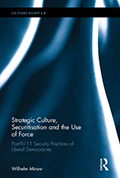Strategic Culture, Securitisation and the Use of Force: Post-9/11 Security Practices of Liberal Democracies

Author(s): Wilhelm Mirow
Series Editor(s): Andreas Wenger
Series: CSS Studies in Security and International Relations
Publisher(s): Routledge
Publication Year: 2016
Publication Place: London
